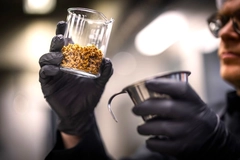
- Industry news
Industry news
- Category news
Category news
- Reports
- Key trends
- Multimedia
- Journal
- Events
- Suppliers
- Home
- Industry news
Industry news
- Category news
Category news
- Reports
- Key trends
- Multimedia
- Events
- Suppliers

05 Jul 2018 --- The Grocery Manufacturers Association is calling on the US Department of Agriculture (USDA) to require the disclosure of refined ingredients derived from bioengineered crops in food and beverage products in regulations for the federal labeling law.
“Our member companies have an unwavering commitment to meeting consumer demands for more information about the food and beverage products they purchase and consume,” said Dr. Leon Bruner, GMA’s Chief Science Officer.
“Consumers expect to know if a product contains an ingredient that was sourced from a bioengineered crop, so it is essential that disclosure of this information be required under a final rule for the National Bioengineered Food Disclosure Standard.”

“Food and beverage manufacturers have a unique role and perspective as the most consumer-facing portion of the product supply chain and their products are held to a high standard by consumers,” stated GMA in its written comments on USDA’s proposed rule.
“If consumers do not believe that they are getting the transparency and ingredient information they demand, the repercussions will be felt most directly by the companies that make their food and beverage products.”
GMA also stressed in its comments that USDA’s decision on whether to require the disclosure of refined ingredients derived from bioengineered crops would have a significant impact on the number of products that would be disclosed under the eventual final rule.
Approximately 90 percent of the US corn, soybean, and beet sugar crops are bioengineered. As a result, a substantial number of food and beverage products contain refined ingredients that come from these products.
GMA estimates that excluding refined ingredients from the scope of the mandatory disclosure standard would result in 78 percent fewer products being disclosed under federal law.
“Our ability to provide consumers with the information they seek – and in a way that they understand – will build trust in brands, industry and government institutions,” GMA said in its comments. “The ease with which the final regulations enable full disclosure of information to consumers will either support or diminish our ability to engage in a dialogue with consumers about technologies that improve lives, society and the environment.”
GMA also said that disclosure to consumers should occur when the cumulative weight of bioengineered ingredients exceeds 0.9 percent of a finished food product.
This will provide consumers with a standard that is transparent while acknowledging that similar allowances for very small amounts of bioengineered ingredients are made in the US for products certified as non-GMO.












